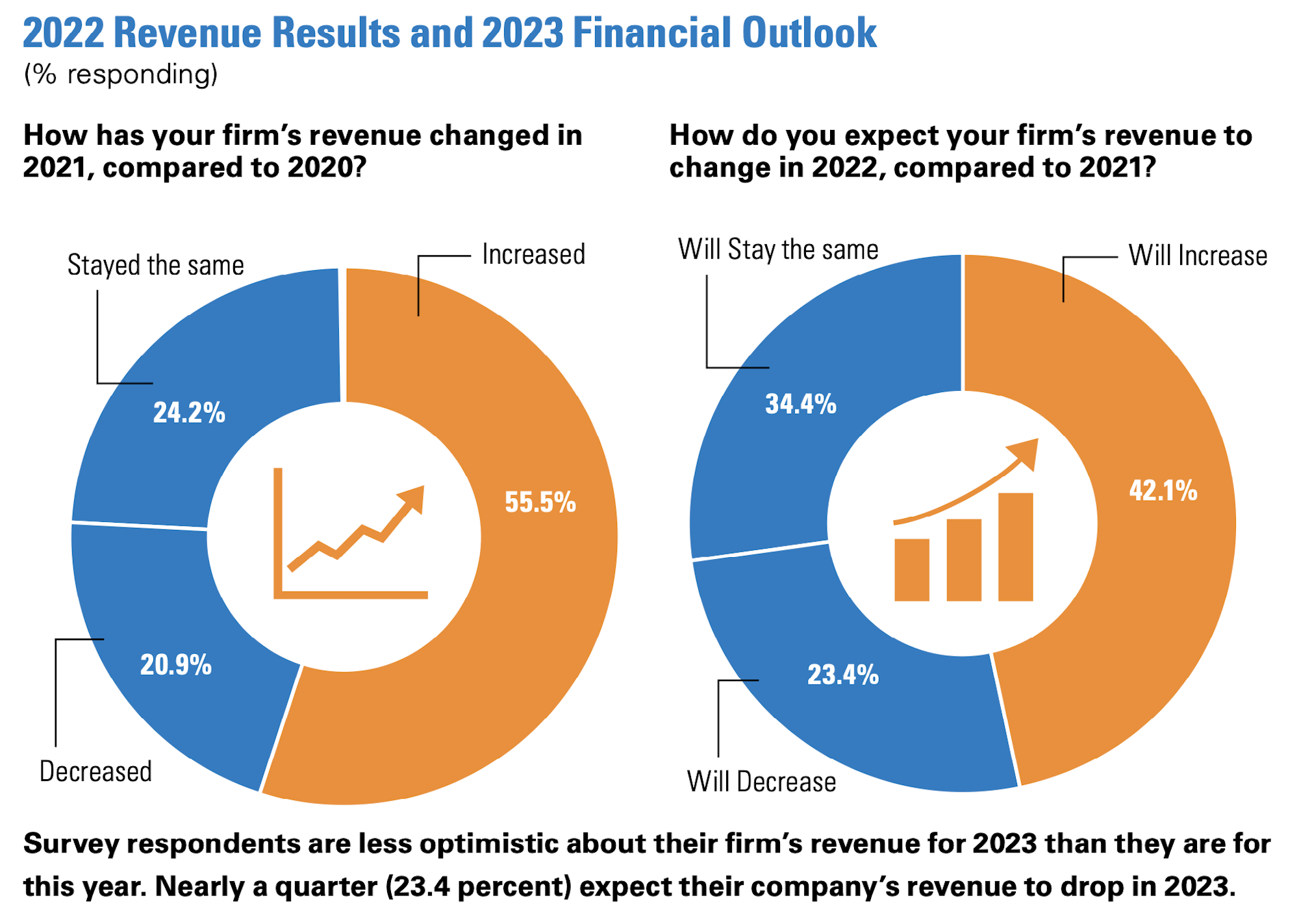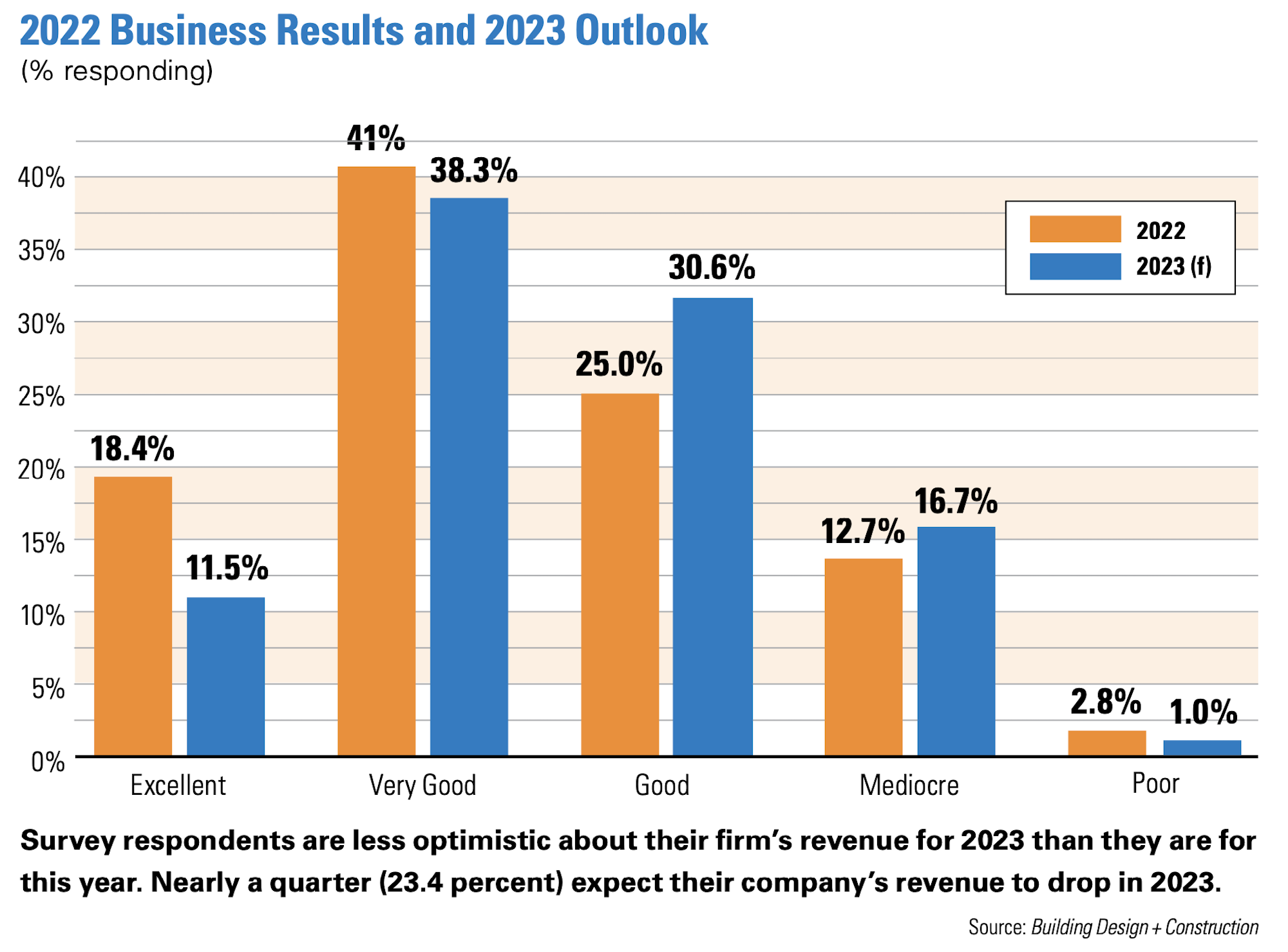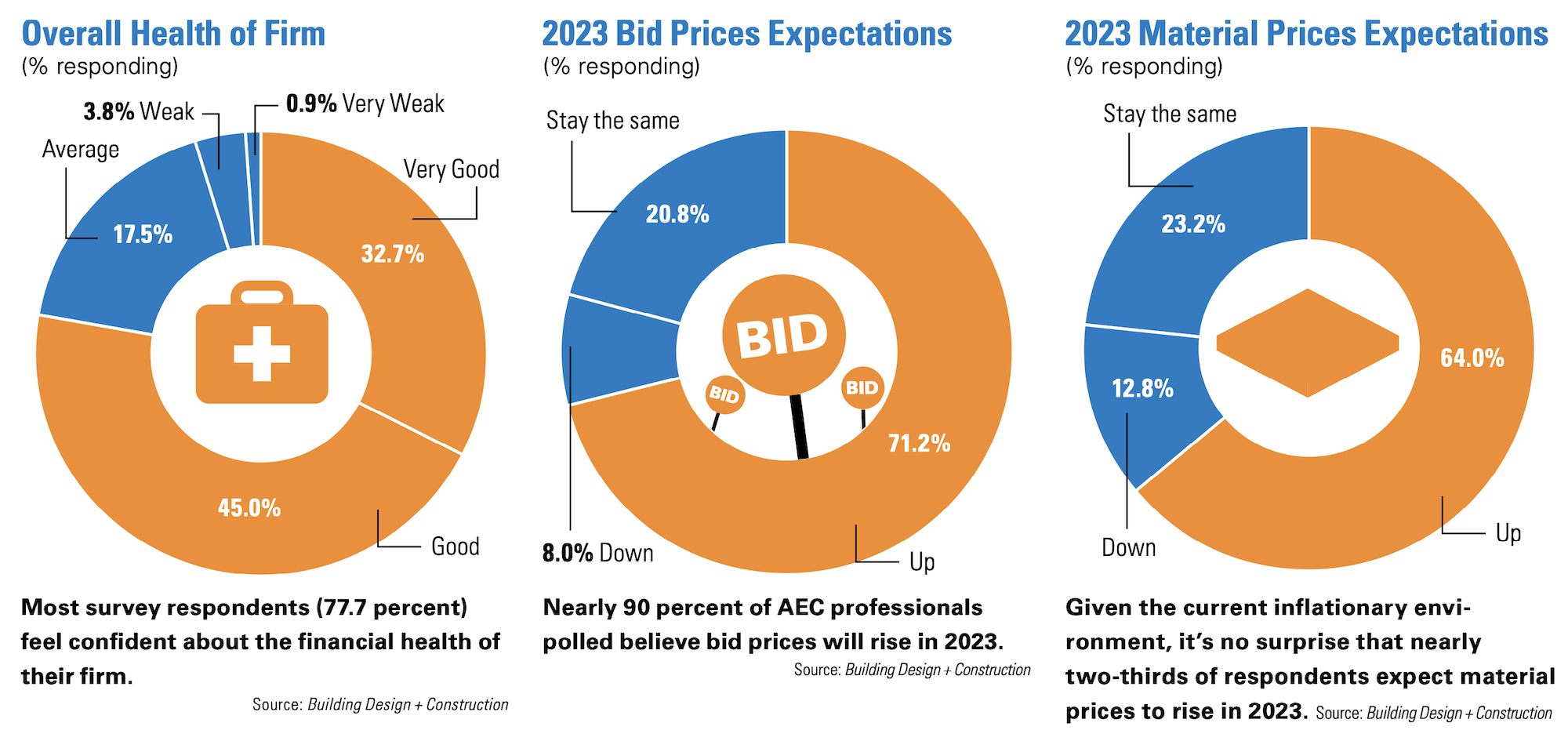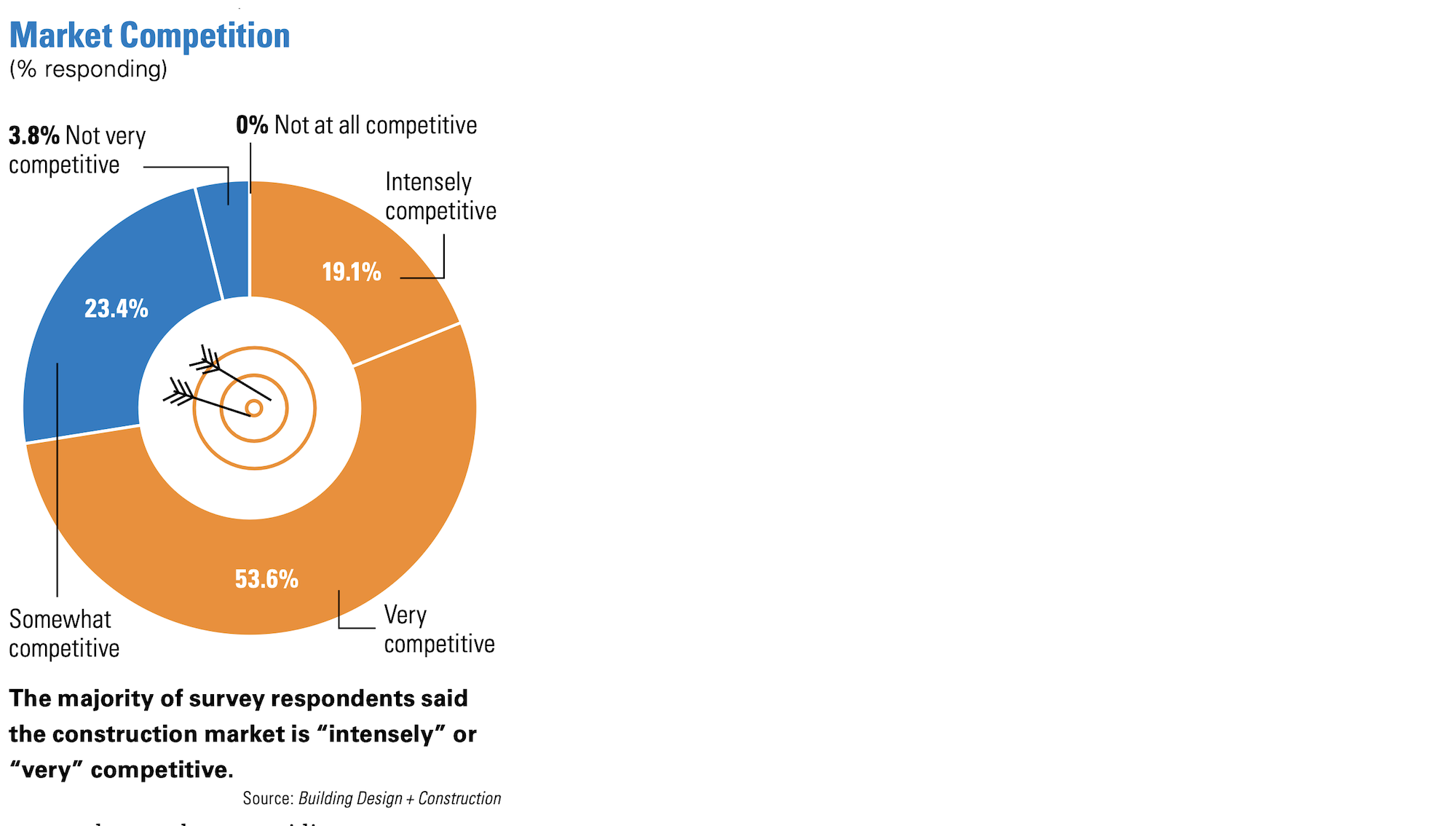Through September, spending on nonresidential construction was up 9.2%, to $883.9 billion, according to preliminary estimates by the Commerce Department’s Bureau of the Census. Sectors hard-hit by the coronavirus pandemic—including lodging, retail/commercial, and even office—were showing signs of life.
So it makes sense that a recent polling of 212 architects, engineers, contractors, and developer/owners found nearly three-fifths of respondents—59.4%—rating 2022 an “excellent” or “good” business year. Only 15.6% rated the year “mediocre” or “poor.”
The vast majority of firms, 77.7%, rated their overall health “very good” or “good.” Conversely, only 4.7% saw their firms’ financial condition as either “weak” or “very weak.” Among the firms polled, 55% confirmed their revenue had increased, and another 20.9% said their revenue was level with last year’s. Gains were achieved despite nearly three-quarters of the firms surveyed characterizing the construction/materials market hobbled by supply-chain snags as “intensely” or “very” competitive.

Euphoria, though, might be short-lived, and firms are tempering their prognoses about the future. Nearly one-quarter—23.4%—expect their revenue to be down in 2023, and another 34.4% predict a flat year. Competition ranked third, behind general economic conditions and inflation, as the most important concern AEC firms believe they will face next year. Nearly two-thirds—64%—anticipate that materials prices will continue to rise in 2023. An even higher number, 71.2%, said they were girding for increases in bid prices for projects.
Our poll also found at least one-fifth of firms are concerned about the availability of capital funding for projects, regulations, cashflow management, and keeping their staffs motivated.
When asked about what business development strategies they planned to deploy next year, more than half—53.4%—said they would hire selectively to burnish their firms’ competitiveness, and 47.1% were planning to step up their staff training and education to enhance competitiveness.

Other business strategies these firms are plotting include increasing their marketing and public relations (25.3% of firms polled currently don’t use social media, and among that do LinkedIn is their preferred platform), investing more in technology, and creating new service or business opportunity.
U.S. design and construction firms pick their battles, sector by sector
Our survey asked AEC firms to assess their prospects in 18 construction sectors. Sizable percentages (at least 30%) were hopeful about business for airports, data centers, government/military buildings, healthcare, industrial/warehouse, multifamily and senior living residential, science + technology, and university. At least 20% of respondents saw their prospects as “average” for performing arts centers, hospitality, K-12 education, and sports and recreations. AEC firms placed offices and interior fitouts, religious, and retail/commercial in the “weak” or “very weak” categories.
Here's a closer look at their responses. Keep in mind that these firms aren’t active in every sector, so the numbers providing ratings were smaller than the total in each category. It’s also worth noting that nearly one-third of the AEC firms polled generate between 25% and 74% of their annual business from reconstruction projects:
• Healthcare appears to hold out the greatest opportunities for next year. More than 45% of respondents rated their prospects in this sector as excellent or good. Multifamily received those ratings from 43.1% or AEC firms polled, industrial/warehouse from 39.7%, and data centers from 37.8%.

• Through September, construction spending in the office sector was up only 0.7%, according to Census Bureau estimates. The AEC firms that responded to our survey aren’t anticipating a rebound in this sector any time soon: 41.3% rated their prospects weak or very week. Another 23.5% gave the same ratings to office interiors and fitouts.
Even though Census estimates that the commercial sector (which encompasses retail) was up 22.4% through September, our survey’s respondents are still taking a wait-and-see approach, as 33.3% saw their prospects in retail next year as weak or very weak.

• 29% of respondents said their firms don’t build in the retail sector. And even with the uptick in firms that have expanded their practices and services, only around 10% of our survey’s respondents see mergers or acquisitions in their immediate futures. Our survey reveals an industry whose firms, in many cases, focus on a limited array of typologies and clients, and leave other sectors to specialists.
It was not surprising that 53.2% of respondent firms aren’t building airports and 41.2% aren’t active in the religious sector. Only about half of respondent firms—46.2%—engage performing arts center projects, and 44.3% keep their distances from data centers. But even some of the broader sectors, notably education, find between 30% and 33% of respondent firms absent. Nearly two-fifths aren’t active in science + technology construction, either, and more than two-fifths don’t build in the multifamily sector.
Related Stories
Hotel Facilities | Oct 29, 2024
Hotel construction pipeline surpasses 6,200 projects at Q3 2024
According to the U.S. Hotel Construction Pipeline Trend Report from Lodging Econometrics, the total hotel pipeline stands at 6,211 projects/722,821 rooms, a new all-time high for projects in the U.S.
Office Buildings | Oct 21, 2024
3 surprises impacting the return to the office
This blog series exploring Gensler's Workplace Survey shows the top three surprises uncovered in the return to the office.
MFPRO+ Research | Oct 15, 2024
Multifamily rents drop in September 2024
The average multifamily rent fell by $3 in September to $1,750, while year-over-year growth was unchanged at 0.9 percent.
Contractors | Oct 1, 2024
Conflict resolution is a critical skill for contractors
Contractors interact with other companies seventeen times a day on average, and nearly half of those interactions (eight) involve conflicts, according to a report by Dodge Construction Network and Dusty Robotics. The study suggests that specialty trade contractors, in particular, rarely experience good resolution from conflicts.
Contractors | Oct 1, 2024
Demographic, societal trends bode poorly for future construction workforce
U.S. employers will soon face “the largest labor shortage the country has ever seen,” according to a report from Lightcast, a labor market data and analysis firm. The problem will be especially acute in fields like plumbing, HVAC, and auto maintenance.
Laboratories | Sep 27, 2024
Traditional lab design doesn't address neurodiverse needs, study finds
A study conducted by ARC, HOK, and the University of the West of Scotland, has revealed that half (48.1%) of all survey respondents who work in laboratory settings identify as neurodivergent.
AEC Tech | Sep 25, 2024
Construction industry report shows increased use of robotics on jobsites
Nearly two-thirds of contractors surveyed, who cited use of robotics on jobsites, are either using monitoring and/or service/labor robotics.
The Changing Built Environment | Sep 23, 2024
Half-century real estate data shows top cities for multifamily housing, self-storage, and more
Research platform StorageCafe has conducted an analysis of U.S. real estate activity from 1980 to 2023, focusing on six major sectors: single-family, multifamily, industrial, office, retail, and self-storage.
Student Housing | Sep 17, 2024
Student housing market stays strong in summer 2024
As the summer season winds down, student housing performance remains strong. Preleasing for Yardi 200 schools rose to 89.2% in July 2024, falling just slightly behind the same period last year.
Adaptive Reuse | Sep 12, 2024
White paper on office-to-residential conversions released by IAPMO
IAPMO has published a new white paper titled “Adaptive Reuse: Converting Offices to Multi-Residential Family,” a comprehensive analysis of addressing housing shortages through the conversion of office spaces into residential units.

















